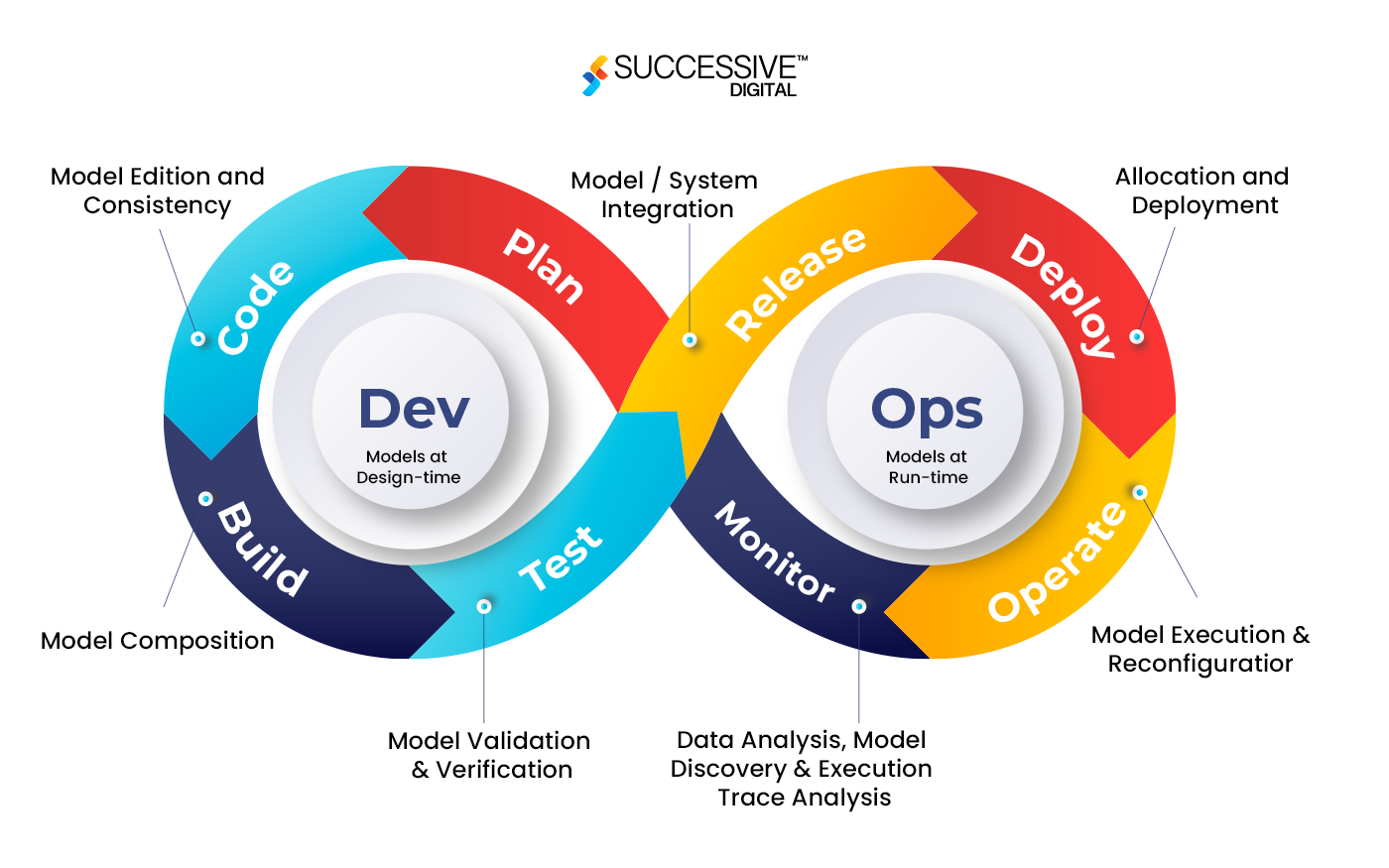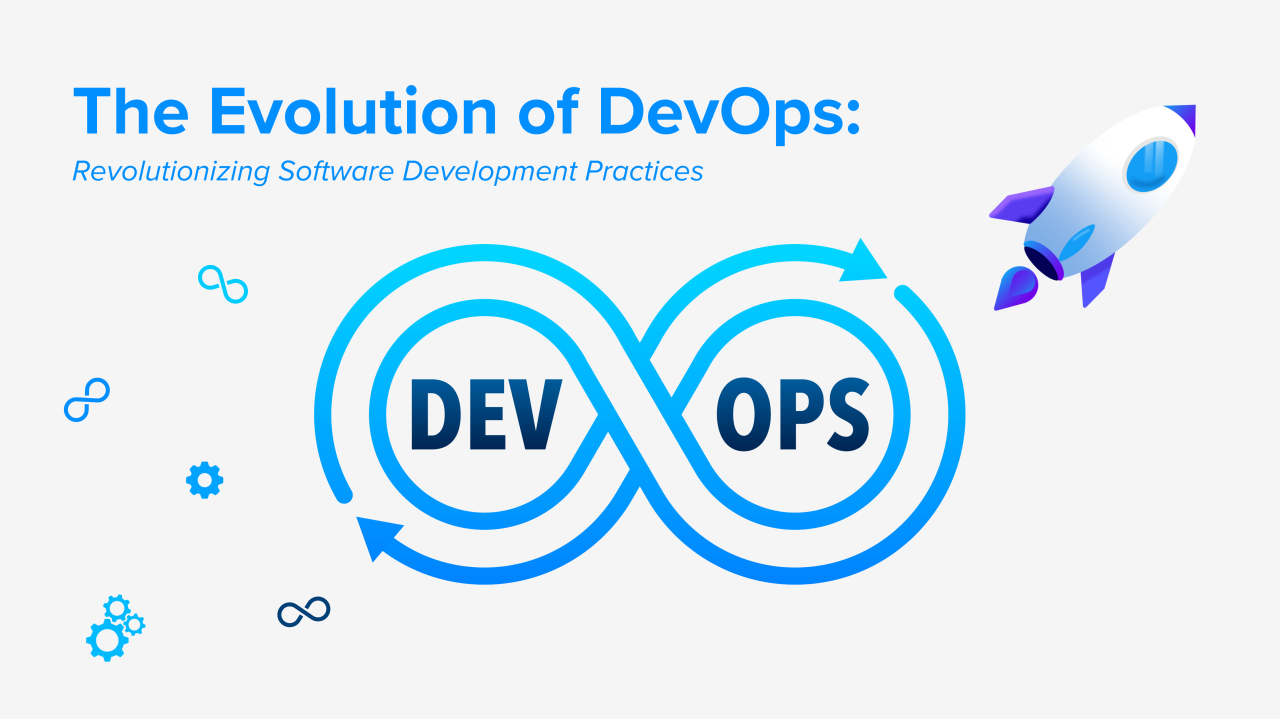We live in a time of constant change, where new startups seem to pop up every minute. To stay ahead, companies need to excel at digital transformation. As technology advances, new tools and ideas emerge to support this shift. One crucial aspect of going digital is bringing together development and operations teams.
This is where DevOps comes in. It bridges the gap between development and operations by fostering better collaboration and communication, a fundamental aspect of CloudOps. This leads to greater efficiency and effectiveness. In our fast-paced digital world, customers expect quick and efficient service, making Dev Operations and Cloud Management game changers for businesses.

Table of Contents
ToggleWhat is DevOps?
DevOps, a blend of “development” and “operations,” emphasizes teamwork and communication between software developers and IT operations teams. The goal is to shorten the development lifecycle and continuously deliver high-quality software.
By promoting automation, monitoring, and feedback loops, it ensures rapid iteration and constant improvement.
Importance Of DevOps In Software Development
DevOps is crucial for successful digital transformation. It opens up limitless possibilities, helping businesses discover new revenue streams and stay on top of the latest trends. However, pinpointing its exact role in digital transformation can be challenging.
What’s clear is that DevOps supports businesses on their digital journey by breaking down silos and fostering a collaborative organizational culture, paving the way for continuous growth. Let’s explore its benefits in Software Development.
5 Benefits
Implementing Dev Operation practices brings numerous benefits to software development teams and organizations by enhancing collaboration, efficiency, and overall software quality. Here are some of the key benefits:
Faster Time to Market
DevOps speeds up the software development lifecycle, so teams can release features and updates more frequently and reliably. This means we can deliver new functionalities to our users faster, keeping our products competitive and responsive to market needs.
Improved Quality
By automating tasks like testing and using continuous feedback loops, DevOps helps us create software of higher quality. Fewer defects and quicker bug fixes mean our customers experience fewer issues and enjoy more reliable software.
Increased Collaboration
Dev Operations breaks down barriers between teams, encouraging collaboration, sharing knowledge, and fostering a sense of shared responsibility. This collaboration enhances communication across departments, making our workflows smoother and our outcomes better.
Scalability and Flexibility
With Infrastructure as Code (IaC) and automated deployment, Dev Operations allows us to scale our infrastructure quickly and adapt to changes in business requirements and customer demands. This flexibility ensures we can grow efficiently without compromising on performance or reliability.
Enhanced Reliability
Continuous monitoring and proactive issue identification through feedback mechanisms help us maintain more reliable and resilient systems. By staying on top of performance and system health, we can prevent problems before they affect our users, ensuring our services are always available and dependable.
Emergence Of DevOps Practices
The rise of DevOps marks a significant shift in software development and delivery. As modern software systems grew more complex, traditional siloed approaches couldn’t keep up with the evolving needs of businesses. This led to the birth of Dev Operations, a more cohesive and streamlined methodology.
Pioneers
Influential figures like Patrick Debois and Andrew Clay Shafer were at the forefront of this movement. Their pioneering efforts in promoting DevOps principles and practices—such as collaboration, automation, and continuous delivery—laid the foundation for this transformative approach.
DevOps As A Cultural And Organizational Shift
DevOps is more than just a set of tools or practices; it represents a cultural and organizational shift. It aims to foster synergy between development and operations teams by breaking down traditional barriers and promoting cross-functional collaboration. This creates a shared sense of responsibility and accountability across the entire software development lifecycle.
Automation
Central to the DevOps philosophy is the idea of automating repetitive tasks and streamlining processes, thereby reducing manual errors and increasing efficiency. This emphasis on automation extends beyond just code deployment to encompass infrastructure provisioning, testing, monitoring, and more.
Benefits Of Automation In DevOps
Automation in DevOps ensures that tasks such as setting up servers, configuring networks, and deploying applications are performed consistently and reliably. This reduces the risk of human error and frees up teams to focus on more strategic activities.
By incorporating automation, Dev Operations accelerates the software development lifecycle and improves the overall quality of the software delivered.
The Role Of CloudOps
Incorporating CloudOps into this framework further enhances these capabilities. CloudOps, as an IT company specializing in cloud infrastructure and services, focuses on automating and optimizing the management of cloud environments. This ensures that cloud services are efficient, secure, and scalable. As businesses increasingly migrate to the cloud, the synergy between DevOps and CloudOps becomes essential.
Together, Dev operations and CloudOps provide a robust foundation for continuous integration and continuous delivery (CI/CD), enabling organizations to rapidly develop, deploy, and manage applications in the cloud. This integration drives innovation, maintains competitive advantage, and supports the ongoing digital transformation efforts of businesses.
Key Principles Of DevOps

The key principles of Dev Ops are designed to foster a culture of collaboration, innovation, and continuous improvement. These principles guide teams to adopt practices that prioritize rapid delivery, reliability, and security while promoting a mindset shift towards ownership, accountability, and transparency.
Collaboration
DevOps fosters a culture of collaboration and shared responsibility among developers, operations teams, and other stakeholders. By breaking down silos and promoting cross-functional teams, Dev Ops enables faster problem-solving and innovation.
This collaborative spirit ensures everyone is on the same page, working towards common goals, and contributing to the success of the project. With CloudOps, this collaboration extends into the realm of cloud infrastructure, ensuring that cloud environments are managed efficiently and effectively.
Automation
Automation is a core tenet of DevOps. It involves automating repetitive tasks such as code testing, deployment, and infrastructure provisioning. Automation reduces human error, accelerates processes, and frees up teams to focus on higher-value work.
CloudOps, as an expert in cloud services, enhances this automation by optimizing the management of cloud resources, ensuring they are used efficiently and securely. This allows teams to leverage the full potential of cloud technology without being bogged down by manual tasks.
Continuous Integration/Continuous Delivery (CI/CD)
CI/CD is a cornerstone of Dev Ops workflows. It involves integrating code changes into a shared repository frequently, followed by automated testing and continuous delivery to production environments. This practice ensures that software is always deployable and ready for release.
With CloudOps, the CI/CD pipeline is further streamlined by incorporating cloud-based solutions, making deployments faster, more reliable, and scalable. This integration of DevOps and CloudOps ensures that applications can be rapidly developed, tested, and deployed, keeping businesses agile and competitive in a fast-paced digital landscape.
Infrastructure As Code (IaC)
Infrastructure as Cod (IaC) treats infrastructure configurations as code, allowing teams to manage and provision infrastructure resources programmatically. This approach improves scalability, repeatability, and consistency in infrastructure management.
CloudOps plays a crucial role here by ensuring that cloud infrastructure is provisioned and managed efficiently using IaC principles. This not only simplifies deployment processes but also enhances the agility and reliability of infrastructure operations in dynamic cloud environments.
Monitoring And Feedback
DevOps promotes continuous monitoring of applications and infrastructure to detect issues early and gather valuable feedback. Monitoring tools provide insights into performance, user experience, and system health, enabling teams to make data-driven decisions and drive continuous improvement.
CloudOps complements this by implementing robust monitoring solutions tailored to cloud environments. By monitoring cloud infrastructure and services closely, CloudOps ensures optimal performance, security, and cost-efficiency. This proactive approach helps teams identify potential issues before they impact users and facilitates continuous optimization of cloud resources.
Conclusion
Dev Ops has completely changed how we develop and deliver software. By following DevOps principles, companies can work faster, adapt to changes more easily, and make better software. As technology keeps moving forward, DevOps will keep being really important for coming up with new ideas and making our software even better.
Adding in CloudOps makes things even stronger by helping us manage our cloud systems efficiently and securely. With Dev Operations and Cloud Management together, we can innovate quickly, run our systems smoothly, and create top-notch software that meets our goals and impresses our customers in today’s fast-paced digital world.
FAQs
DevOps is a collaborative approach that combines development (Dev) and operations (Ops) teams to streamline software development and deployment processes. It emphasizes automation, continuous integration, and continuous delivery to achieve faster and more reliable software releases. DevOps enhances efficiency by automating repetitive tasks and improving collaboration between teams. It accelerates software delivery, reduces errors, and fosters a culture of continuous improvement, crucial for staying competitive in today's market. Adopting DevOps leads to faster time to market, improved software quality with fewer defects, increased collaboration across teams, and enhanced scalability to meet changing business needs. It also promotes faster innovation cycles and better responsiveness to customer feedback. CloudOps, or Cloud Operations, focuses on managing and optimizing cloud infrastructure and services. It includes tasks like provisioning resources, monitoring performance, ensuring security, and optimizing costs within cloud environments. CloudOps complements DevOps by providing the infrastructure support needed for agile and scalable software development and deployment. It automates cloud management tasks, ensures resource efficiency, and enhances security and compliance, aligning with DevOps principles of automation and efficiency. Integrating CloudOps with DevOps enhances scalability, flexibility, and reliability of software operations in cloud environments. It enables rapid provisioning of resources, efficient management of cloud services, and proactive monitoring for enhanced system performance and resilience. DevOps and CloudOps together empower software development teams to innovate faster, deliver higher-quality software, and respond quickly to market changes. They enable seamless collaboration, automate repetitive tasks, and ensure robust management of cloud infrastructure, resulting in more efficient and resilient software operations.What is DevOps?
Why is DevOps important?
What are the benefits of adopting DevOps?
What is CloudOps?
How does CloudOps complement DevOps?
What are the advantages of integrating CloudOps with DevOps?
How do DevOps and CloudOps benefit software development teams?


